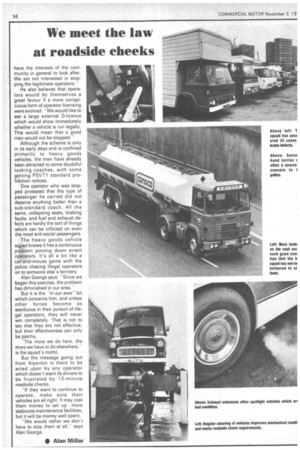We meet the law at roadside cheeks
Page 58

If you've noticed an error in this article please click here to report it so we can fix it.
have the interests of the cornmunity in general to look after. We are not interested in stopping the legitimate operators."
He also believes that operators would do themselves a great favour if a more conspicuous form of operator licensing were evolved. "We would like to see a large external 0-licence which would show immediately whether a vehicle is run legally. This would mean that a good man would not be stopped."
Although the scheme is only in its early days and is confined primarily to heavy goods vehicles, the men have already been attracted to some doubtful looking coaches, with some getting PSV71 standard prohibition notices.
One operator who was stopped protested that the type of passenger he carried did not deserve anything better than a sub-standard coach. All the same, collapsing seats, braking faults, and fuel and exhaust defects are hardly the sort of things which can be inflicted on even the most anti-social passengers.
The heavy goods vehicle squad knows it has a continuous problem pinning down errant operators. It's all a bit like a cat-and-mouse game with the police chasing illegal operators on to someone else's territory.
Alan George says: "Since we began this exercise, the problem has diminished in our area."
But it is the "in our area" bit which concerns him, and unless other forces become as assiduous in their pursuit of illegal operators, they will never win completely. That is not to say that they are not effective, but their effectiveness can only be patchy.
"The more we do here, the more we have to do elsewhere," is the squad's motto.
But the message going out from Alperton is there to be acted upon by any operator which doesn't want its drivers to be frustrated by 1 5-minute roadside checks.
'If they want to continue to operate, make sure their vehicles are all right. It may cost them money to set up more elaborate maintenance facilities, but it will be money well spent. "We would rather we don't have to stop them at all," says Alan George.




























































































































